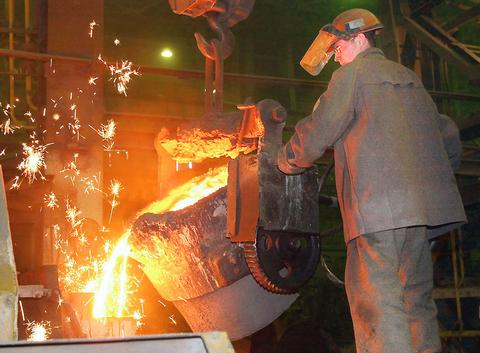The WTO yesterday launched a probe to decide by the end of this year on whether hefty tariffs on steel imports imposed by the US violate international trade agreements.
Countries in the 144-member body approved creation of a three-person expert panel -- requested by the EU with support from Japan, China and South Korea -- at a meeting of the WTO's Dispute Settlement Body (DSB).
The US, which insists the measures imposed in March are in line with WTO rules and says it will defend its case vigorously, blocked a first request from the EU at a DSB meeting on May 22.

PHOTO: AP
But under the trade watchdog's dispute regulations, it could not do so a second time and Monday's decision to set up the panel was automatic and taken without debate.
The steel row -- which has set the US against most other producer countries -- has stoked accusations that the administration of President George W. Bush is pursuing a unilateralist course to serve his own domestic political aims.
Those charges have been intensified with Bush's approval of a farm bill pumping huge new subsidies into US agro-businesses active on global markets and with US refusal to commit to new targets aimed at reducing global warming and others on promoting world sustainable development.
Members of the WTO panel -- which is expected to fold the Chinese, Japanese and South Korean cases into that of the EU -- are likely to be selected within the next month and under DSB regulations would normally have up to six months to hand down a ruling. But this time-frame can be extended, and diplomats say they doubt that the panel could stick to the deadline in such a complicated -- and politically sensitive -- dispute.
Even when it is handed down, the panel's ruling can be challenged by either side, moving the case to the WTO s quasi-judicial Appellate Body.
Appeals hearings and other procedures would mean that it could be late next year before there is a final decision.
The EU and several other countries -- which also include Brazil, Norway and Switzerland -- argue that the tariffs of up to 30 percent on a wide range of steel products are in violation of a range of WTO pacts, including the Safeguards Agreement invoked by Bush in announcing them in early March.
Brussels and Tokyo say that the agreement allows them to impose retaliatory tariffs on other US goods from June 18 unless Washington offers them compensation for their losses on steel sales to the US. But they have indicated that they may hold off to allow more time for a US move in that direction.

SECURITY: As China is ‘reshaping’ Hong Kong’s population, Taiwan must raise the eligibility threshold for applications from Hong Kongers, Chiu Chui-cheng said When Hong Kong and Macau citizens apply for residency in Taiwan, it would be under a new category that includes a “national security observation period,” Mainland Affairs Council (MAC) Minister Chiu Chui-cheng (邱垂正) said yesterday. President William Lai (賴清德) on March 13 announced 17 strategies to counter China’s aggression toward Taiwan, including incorporating national security considerations into the review process for residency applications from Hong Kong and Macau citizens. The situation in Hong Kong is constantly changing, Chiu said to media yesterday on the sidelines of the Taipei Technology Run hosted by the Taipei Neihu Technology Park Development Association. With

CARROT AND STICK: While unrelenting in its military threats, China attracted nearly 40,000 Taiwanese to over 400 business events last year Nearly 40,000 Taiwanese last year joined industry events in China, such as conferences and trade fairs, supported by the Chinese government, a study showed yesterday, as Beijing ramps up a charm offensive toward Taipei alongside military pressure. China has long taken a carrot-and-stick approach to Taiwan, threatening it with the prospect of military action while reaching out to those it believes are amenable to Beijing’s point of view. Taiwanese security officials are wary of what they see as Beijing’s influence campaigns to sway public opinion after Taipei and Beijing gradually resumed travel links halted by the COVID-19 pandemic, but the scale of

A US Marine Corps regiment equipped with Naval Strike Missiles (NSM) is set to participate in the upcoming Balikatan 25 exercise in the Luzon Strait, marking the system’s first-ever deployment in the Philippines. US and Philippine officials have separately confirmed that the Navy Marine Expeditionary Ship Interdiction System (NMESIS) — the mobile launch platform for the Naval Strike Missile — would take part in the joint exercise. The missiles are being deployed to “a strategic first island chain chokepoint” in the waters between Taiwan proper and the Philippines, US-based Naval News reported. “The Luzon Strait and Bashi Channel represent a critical access

Pope Francis is be laid to rest on Saturday after lying in state for three days in St Peter’s Basilica, where the faithful are expected to flock to pay their respects to history’s first Latin American pontiff. The cardinals met yesterday in the Vatican’s synod hall to chart the next steps before a conclave begins to choose Francis’ successor, as condolences poured in from around the world. According to current norms, the conclave must begin between May 5 and 10. The cardinals set the funeral for Saturday at 10am in St Peter’s Square, to be celebrated by the dean of the College